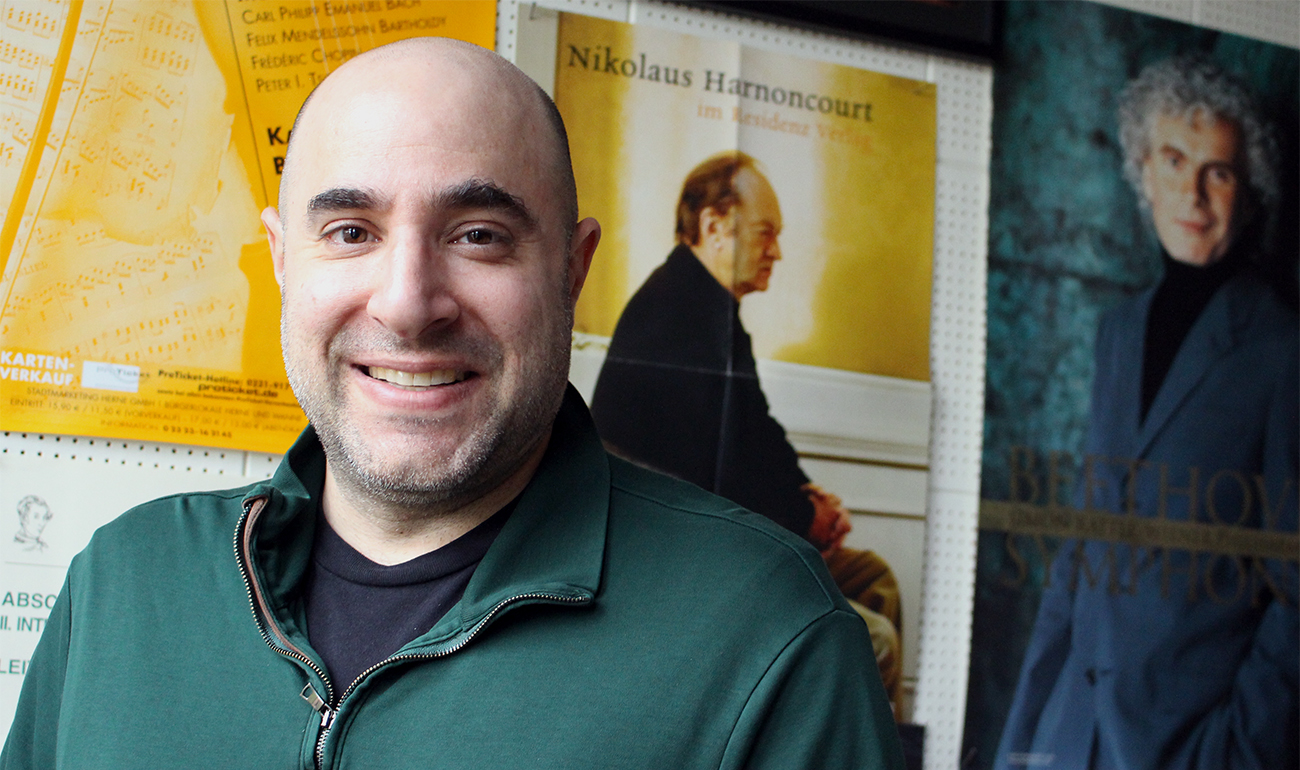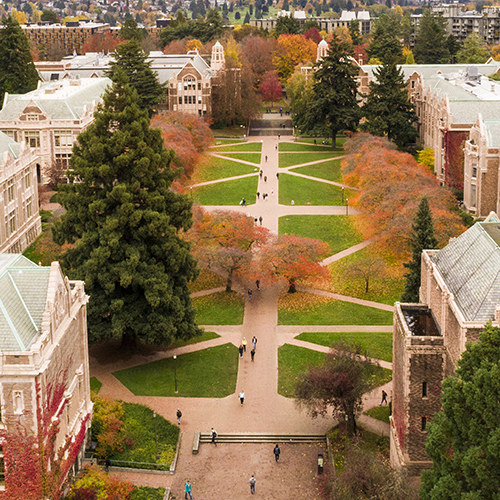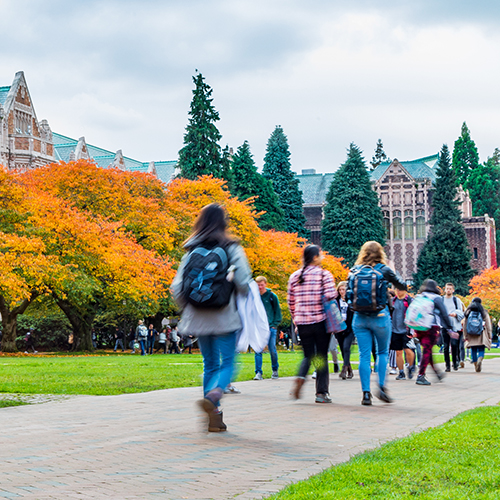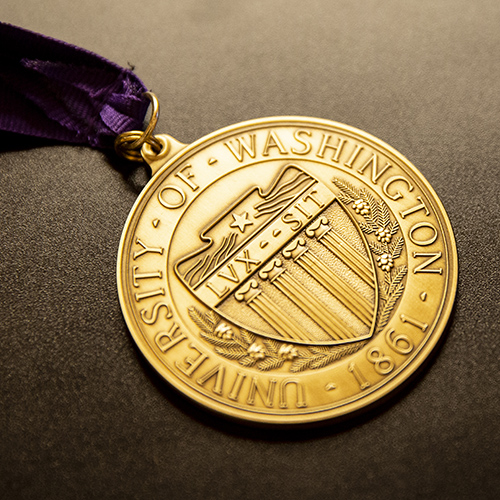Featured Awards
Accolades for the Symphony
A "Breakthrough" in Fundamental Physics
Francis Named Freedom Scholar
Language Teacher of the Year? Sim!
Awards in Memory of UW Faculty
Good News for Data Science
Other Awards
Honorary Awards
Publication Awards
New Professorship & Chair Appointments
Other Honors

Accolades for the Symphony
Since the arrival of COVID-19, David Alexander Rahbee, director of the UW Symphony Orchestra and chair of orchestral conducting in the UW School of Music, has been limited in his ability to rehearse with musicians in the UW Symphony Orchestra. Through 30-minute rehearsal segments, each involving up to 8 musicians seated 6 feet apart, they have still managed to create memorable performances available for online viewing. But recent honors from The American Prize are reminders of what they can achieve when they are able to meet again as a full orchestra.
The American Prize is a series of national competitions that recognize the best recorded performances by ensembles and individuals in the US at the professional, college/university, church, community, and secondary school levels. In 2020, Rahbee and the orchestra placed in three American Prize categories, placing first in orchestra conducting, second in orchestra programming, and third in orchestra performance in the college/university division.
The awards are based on recordings or programming submitted online. Each year Rahbee selects and submits the best audio recordings for the orchestral performance competition, the best video recordings for the conducting competition, and the entire season program for the orchestral programming competition. Due to the American Awards’ lengthy selection process, the prizes awarded this year are for performances during the orchestra’s 2017-18 season.
“We've placed in the finals for these awards each year I’ve been at UW, dating back to the 2013-14 season, but this is the first time we placed first in any of the categories,” Rahbee says. “I am hopeful that we can continue to place highly in the coming years. It's putting our orchestra program back on the map!”
A “Breakthrough” in Fundamental Physics
The Breakthrough Prizes, together with Nobels, are the most prestigious prizes in science. This year, three UW Physics professors — Emeritus Professor Eric Adelberger, Professor Jens Gundlach, and Professor (and former Chair) Blayne Heckel — are the recipients of the 2021 Breakthrough Prize in fundamental physics. They are joined by UW Professor of Biochemistry David Baker, who was awarded the Breakthrough Prize in life sciences. These $3 million prizes have been awarded annually since 2013 by the Breakthrough Foundation.
In 1986, Adelberger and Heckel founded the Eöt-Wash group, devoted to precision measurements testing our understanding of gravity and probing the existence of possible new fundamental forces and the interactions of “dark matter," which to date have only been observed through their long distance gravitational effects. Professor Gundlach joined the group at its inception while he was a graduate student, and subsequently became a tenured faculty member in the department.

The work of this group has led to dramatic advances in laboratory tests of gravity, including precise measurements of the equivalence principle — the observation that all objects, regardless of their composition, experience exactly the same gravitational acceleration — as well as very challenging short-range tests of the inverse-square law, which set the best constraints on many speculative models of possible new physics beyond the Standard Model. Their work has also greatly improved the precision in the measured value of Newton’s gravitational constant.
“I think the award was quite unexpected to all of us, but as a surprise it generates even more joy,” Gundlach says. “Presenting our research to the public was always rewarding because our experiments are intriguing and fun to hear about, but knowing that a panel of famous physicists selected our work feels particularly rewarding.”
Francis Named Freedom Scholar
Megan Francis, associate professor of political science, has spent her career focusing on research and teaching related to economic and social equity. Recognizing her work, the Marguerite Casey Foundation and Group Health Foundation have named her a Freedom Scholar, an honor that comes with a $250,000 grant. The award supports scholars who are shifting the balance of power to families and communities that have been historically excluded from the resources and benefits of society.
“The nation’s boldest scholars stand at the forefront of movements for economic and social justice — they are creating the catalytic ideas for transformative change,” states the Freedom Scholars webpage, adding that the Freedom Scholars Awards are “placing power in the hands of these changemakers…[and] give leaders greater freedom to build a truly representative economy that works for working families and people.”

Francis specializes in the study of American politics, with broad interests in criminal punishment, Black political activism, and racial justice philanthropy. She is the author of the award-winning book Civil Rights and the Making of the Modern American State, and she is currently working on a second book that examines the role of the criminal punishment system in the rebuilding of southern political and economic power after the Civil War.
In addition to her role at the UW, Francis is a Senior Democracy Fellow at the Harvard Kennedy School’s Ash Center for Democratic Governance and Innovation, and a Fellow at the Kennedy School’s Carr Center for Human Rights.
“I am driven by the belief that if we tell full truths and confront who this country actually is — only then will it be possible to begin a process of repair,” Francis says.
Language Teacher of the Year? Sim!
The Washington Association for Language Teaching (WAFLT) traditionally selects a language teacher in the K-12 school system for its annual Teacher of the Year Award. This year the organization broke with its long tradition to honor Eduardo Viana da Silva, associate teaching professor in the Department of Spanish and Portuguese Studies (SPS), as its 2020 Teacher of the Year Award.
The award recognizes the work of language teachers in Washington state for their excellence in the teaching of world languages. SPS Chair Donald Gilbert-Santamaría says Viana da Silva is richly deserving of the honor, noting that his "boundless enthusiasm for his work in the classroom, absolute dedication to his students’ academic success, and impressive leadership make him the driving force behind the unprecedented growth of our Portuguese Program in recent years."

Since joining SPS in 2015, Viana da Silva's tireless work in promoting the Portuguese language and Luso-Brazilian culture has included coordinating an online language exchange program with students in Brazil, helping UW students apply for language fellowships, directing study abroad programs in Brazil, writing an online Portuguese textbook, and more.
Viana da Silva was also the keynote speaker for the 2020 WAFLT Conference. His presentation, "Global Citizenship in the 21st Century Language Classroom," explored the idea of promoting global citizenship through virtual exchange programs.
Awards in Memory of UW Faculty
Two long-time Arts & Sciences faculty members who died earlier this year are being honored through awards bearing their name.
Recognizing History Professor William Rorabaugh as “a pioneer in the social history of alcohol,” the national Alcohol and Drugs History Society has established an annual William J. Rorabaugh Book Prize, to be awarded to the author of a first or second book in English in the field of the history of alcohol and drug studies.

Rorabaugh, who researched and taught American history, wrote about the rise of American alcohol consumption in the late 1700s and early 1800s in his 1979 book The Alcoholic Republic: An American Tradition and returned to the topic in 2018 with Prohibition: A Concise History. He also wrote two books about the 1960s and its counterculture movement, and two books about the Kennedy presidency. He was a supporter and past president of the Alcohol and Drugs History Society.
Also recognized this year was Walter G. Andrews, professor and a founding faculty member of the UW Department of Near Eastern Languages and Civilization (NELC). The American Association for Teachers of Turkic Languages (AATT) announced that its Ottoman Turkish Translation Award is being renamed the Walter G. Andrews Ottoman Turkish Translation Award to commemorate Andrews’ contributions to the field of Ottoman and Turkish Studies. The award is granted annually to the best translation of an Ottoman archival/historical or literary work into English.

Andrews’ work has been foundational for the study of Ottoman Turkish literature and literary culture. He contributed to the field with numerous articles and books, including translations of Ottoman and Turkish poetry that have made them available to a wider public. He was also among the founders of AATT.
“Walter’s love for Turkey and Ottoman literary cultures was deep and all-encompassing, and his enthusiasm for his work was contagious,” says NELC chair Selim Kuru. “He was a meticulous researcher with high standards and a deep understanding, and an empathetic, dedicated, and encouraging teacher.”
Good News for Data Science

The University of Washington’s Center for Studies in Demography & Ecology (CSDE) — along with partners in the Center for Statistics and the Social Sciences and the eScience Institute — is among eight awardees across the country selected to develop training programs in advanced data analytics for population health.
The five-year, $1.8 million training program at the UW, funded by the National Institutes of Health’s Office of Behavioral and Social Sciences Research, will provide 25 academic-year graduate fellowships, develop a new training curriculum, and contribute to methodological advances in health research at the intersection of demography and data science. The new training program will build on CSDE’s graduate certificate in demographic methods by integrating training in advanced statistics and computational methods.
“Our faculty are at the forefront of research programs grounded in advanced data analytics,” says Robert Stacey, dean of the College of Arts and Sciences. “This grant recognizes the important interdisciplinary work happening across the UW, and particularly in the social sciences, to build this knowledge into much-needed education and training programs.”
The new training program will be led by Zack Almquist, assistant professor of sociology. Tyler McCormick, associate professor of sociology and statistics, and Jon Wakefield, professor of statistics and biostatistics, led the grant application with support from Sara Curran, director of the CSDE and a professor of international studies, public policy, and sociology, along with faculty affiliated with CSDE, CSSS and the eScience Institute.
Other Honorary Awards
Kemi Adeyemi, assistant professor of gender, women & sexuality studies and director of The Black Embodiments Studio, has received the Errol Hill Award for Outstanding Scholarship in African American Theatre Studies from the American Society for Theatre Research.
Jason Detwiler, associate professor of physics, has been named an APS Physics Fellow by the American Physical Society for “outstanding contributions...that have advanced our understanding of neutrino properties and fundamental interactions.” Only the top 0.5% of the membership in the American Physical Society are named APS Fellows.
James De Yoreo, affiliate professor of chemistry, was named a Distinguished Scientist Fellow by the U.S. Department of Energy for his “transformational discoveries that have reshaped our understanding of materials synthesis from complex nucleation pathways to hierarchical assembly, for leadership in National Laboratory-University partnerships, and for dedication to mentoring the next generation of scientists.” He will receive $1 million in funding from DOE over three years to pursue new research of his choosing.
Joe Felsenstein, professor emeritus of biology and genome sciences, received a Friend of Darwin Award for 2020 from the National Center for Science Education (NCSE). Friend of Darwin awards are presented annually to a select few whose efforts to support NCSE and its goal of defending the teaching of evolution and climate science have been truly outstanding.
Samson Jenekhe, professor of chemistry, won the American Physical Society’s 2021 Polymer Physics Prize for pioneering and sustained outstanding contributions to the synthesis, photophysics, and structure-morphology-performance relationships in semiconducting polymers for electronic and photovoltaic applications.
Christine Luscombe, professor of chemistry and materials science and engineering, has been elected to the Washington State Academy of Sciences, which recognizes her “outstanding record of scientific and technical achievement and willingness to work on behalf of the academy to bring the best available science to bear on issues within the state of Washington.” Luscombe is also a faculty member with the Clean Energy Institute, the Molecular Engineering & Sciences Institute and the Institute for Nano-engineered Systems.
Sue Moore, research scientist at the Center for Ecosystem Sentinels in the Department of Biology, has been elected to the Washington State Academy of Sciences, for “contributions to the understanding of Arctic marine ecosystems and pioneering the integration of Conventional Science and Indigenous Knowledge to yield better policy decisions.”
Abigail Swann, associate professor of biology and atmospheric sciences, was awarded the American Meteorological Society’s Walter Orr Roberts Lectureship, in recognition of significant contributions to the understanding of atmospheric processes through the effective interchange of knowledge between atmospheric science disciplines or between atmospheric scientists and scientists of other disciplines.
Jim Truman, professor emeritus of biology, was named a 2020 Fellow of the Entomological Society of America, which recognizes “outstanding contributions to entomology in research, teaching, extension and outreach, administration, or the military.”
Daniela Witten, professor of statistics and biostatistics and Dorothy Gilford Endowed Chair of Mathematical Statistics, has been selected to receive the 2021 Leo Breiman Junior Award from the American Statistical Association (ASA). The Leo Breiman Award is presented every two years by the ASA to one senior scholar and one junior scholar based on outstanding theoretical or methodological contributions to machine learning and/or computational statistics — contributions that have made a substantial, sustained impact on the subject and on practical applications.
Sotiris Xantheas, affiliate professor of chemistry, won the Gauss Professorship of the Göttingen Academy of Science, Germany (2020-21). The award, established in 1955 to commemorate the 100th anniversary of the great German mathematician and physicist Carl Friedrich Gauss, enables outstanding scientists to hold Carl Friedrich Gauss' professorial chair at the University of Goettingen for a period of three months.
Publication Awards
George Behlmer, professor of history, was awarded the Stansky Book Prize for his book Risky Shores: Savagery and Colonialism in the Western Pacific. The Stansky Book Prize is awarded annually by the North American Conference on British Studies for the best book published anywhere by a North American scholar on any aspect of British studies since 1800.
Jake Grumbach, assistant professor of political science, and colleagues Alexander Stahn (Berkeley) and Sarah Staszak (Princeton), won the APSA Best REP Paper Award for the paper "Gender, Race, and Intersectionality in Campaign Finance," published in Political Behavior.
Sasha Harmon, professor emeritus of history, received the Western History Association’s Robert G. Athearn Award for Reclaiming the Reservation: Histories of Indian Sovereignty Suppressed and Renewed, a book on the twentieth-century American West.
Margaret O’Mara, Howard and Frances Keller Endowed Professor of History, has been shortlisted for the Columbia University School of Journalism's Lukas Prize, which honors the very best in American non-fiction writing, for her 2019 book, The Code: Silicon Valley and the Remaking of America.
Sarah Quinn, associate professor of sociology, received the Viviana Zelizer Award for Best Book in Economic Sociology and the Alice Amsden Best Book Award from the Society of Socio-Economics for her book, American Bonds: How Credit Markets Shaped a Nation.
David Shields, professor of creative writing, wrote Reality Hunger: A Manifesto in 2010. Ten years later, LitHub has named the book one of the most important books of the last decade.
Maya Sonenberg, professor of creative writing, received the 2021 Sullivan Prize for short fiction for her short story collection, Bad Mothers, Bad Daughters: Stories, which will be published by the University of Notre Dame Press in Fall 2022.
Anu Taranath, teaching professor of English and comparative history of ideas, has received numerous honors for Beyond Guilt Trips: Mindful Travel in an Unequal World. In addition to receiving the Foreword INDIE book award and being a finalist for several other awards, including the Washington State Book Award and the Wishing Shelf book award, the book was included in Oprah Magazine's "26 Best Travel Books.” Taranath has also been named one of Global Shakers’ "40 Leaders in Sustainable Travel."
New Professorship & Chair Appointments
Daniel Bessner, associate professor in the Jackson School of International Studies and adjunct assistant professor of history, was appointed the Joff Hanauer Honors Professor in Western Civilization.
Bing W. Brunton, associate professor of biology, was appointed to the H. Stewart Parker Endowed Faculty Fellowship.
Leela Fernandes, director of the Jackson School of International Studies, was appointed the Stanley D. Golub Endowed Chair.
Ellen Garvens, professor of photo/media, was appointed the Floyd and Delores Jones Endowed Professor in the Arts.
Reşat Kesaba, professor in the Jackson School of International Studies, was appointed The Anne H.H. and Kenneth B. Pyle Professor in American Foreign Policy.
Munira Khalil, professor and chair of chemistry, was appointed the Leon C. Johnson Chemistry Endowed Professor.
Liliana Lengua, professor of psychology, was appointed the Yaffa and Paul Maritz Endowed Professor for the Center for Child and Family Well-Being.
Laurie Marhoefer, associate professor of history, was appointed the Jon Bridgman Endowed Professor in History.
Anne B. McCoy, professor of chemistry, was appointed the Natt-Lingafelter Endowed Professor in Chemistry.
Juliet McMains, professor of dance, was appointed the Floyd & Delores Jones Endowed Professor in the Arts.
Mark Metzler, professor of history and international studies, was appointed the Giovanni and Amne Costigan Endowed Professor in History.
Matthew Mosca, associate professor of history and international studies, was appointed to the Colonel Donald W. Wiethuechter, USA, Ret. Endowed Faculty Fellowship in Military History.
Soumik Pal, professor of mathematics and adjunct professor of applied mathematics, was appointed to the Robert B. Warfield, Jr., Faculty Fellowship in Mathematics.
Juliet Sperling, assistant professor of art history, was appointed the Allan and Mary Kollar Endowed Chair in American Art History.
JoAnn Taricani, director of the school of music and chair of the music history program, was appointed the Aura Bonell Morrison Endowed Professor in Music.
Rekha R. Thomas, associate chair of mathematics, was appointed the Walker Family Endowed Professor in Mathematics.
Deborah Trout, professor of costume design and head of design and production, was appointed the Donald E. Petersen Endowed Professor.
Other Honors
Daniel Bessner, associate professor of international studies and Joff Hanauer Honors Professor in Western Civilization, was named as one of the "Top 11 Scholars" to read to understand the New Left, by Blue Tent, a media site that focuses on dialogue by and for the progressive and Democratic left.
Chris Burdzy, professor of mathematics and adjunct professor of statistics, has been named President-Elect of the Institute of Mathematical Statistics.
Arzoo Osanloo, professor of law, societies & justice and director of the Middle East Center, and Cabeiri Robinson, associate professor of international studies and director of the interdisciplinary PhD program in Near and Middle Eastern Studies, received a prestigious two-year grant from the Mellon Foundation to run a Sawyer Seminar at the UW. Offered via the UW’s Simpson Center for Humanities, the Sawyer Seminar will feature a series of public events on "Humanitarianisms: Migrations and Care through the Global South" during the 2020-21 academic year.
Alicia Beckford Wassink, associate professor of linguistics, has been appointed to the Executive Committee of the Linguistic Society of America. The Executive Committee serves as the governing board of the organization.
Jesse Zalatan, assistant professor of chemistry, was awarded an Early Concept Grant for Exploratory Research (EAGER) award from the National Science Foundation to develop a new type of SARS-CoV-2 antibody test. Reliable and widely-available SARS-CoV-2 antibody testing is critical for researchers to better understand the level of antibodies needed for protection, how long SARS-CoV-2 antibodies last, and the viral loads needed to generate antibody responses. EAGER awards support “high risk, high reward” exploratory research projects involving radically different approaches, the application of new expertise, or novel disciplinary or interdisciplinary perspectives. Zalatan and James Carothers, associate professor of chemical engineering, will receive $300,000 over a one-year period from funds made available through the Coronavirus Aid, Relief, and Economic Security (CARES) Act.
More Stories

A Nobel, an Inventor, a Polymath & More
Recent awards and appointments celebrate Arts & Sciences faculty and staff for their research, leadership, and more.

Meet Our 2024 Graduate Medalists
Meet the three students selected by the College of Arts & Sciences as 2024 Graduate Medalists for their accomplishments.

Celebrating Excellence in Arts & Sciences in 2024
This spring, the UW and the College of Arts & Sciences celebrated faculty, staff, and students for their many accomplishments.